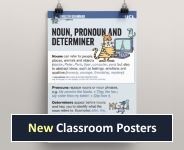Topic: Y6 GPaS (SPaG) Test
Relevant for the Year 6 GPaS test requirements, according to the UK National Curriculum. GPaS (Grammar, Punctuation, and Spelling) is also known colloquially as 'SPaG'.
A new Englicious app for practising for this test (Paper 1) is now available from UCL. Click on the icon on the left for more information.
Englicious contains many resources for English language in schools, but the vast majority of them require you to register and log in first. For more information, see What is Englicious?

